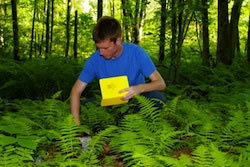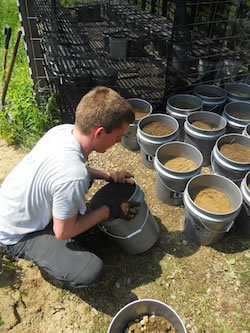
Kevin Towle ‘12, a biological sciences major, is completing a competitive summer fellowship to research the effects of climate change on New England ant ecology.
The fellowship, funded by the National Science Foundation Research Experience for Undergraduates (REU) program, takes place at Harvard Forest, a long–term ecological research site under the aegis of Harvard University. Towle has collaborated with members of his cohort and with research mentors Aaron Ellison and Shannon Pelini of Harvard Forest and Israel Del Toro of the University of Massachusetts.
Ants are a model taxon for climate–change studies because of their ubiquity and intricate involvement with local ecosystems. Ants play an important role in seed dispersal, maintain mutualistic relationships with other species such as aphids, and function on multiple levels of the food web — acting as carnivores, herbivores, scavengers, and decomposers. As such, changes to the ants environment can have broad and subtle ramifications.

Towle and his collaborators maintained one habitat different temperatures from ambient to 6°C above ambient, across 12 plots. As a result of the increased temperature, certain populations are expected to increase while decreasing overall biodiversity, creating imbalances due to decreased variety of activity. Among other consequences, the project will examine changing species interactions, modifications to ant nest architecture and temperature control, and the effect of decreased biodiversity on seed dispersal and soil movement.
Towle is one of several hundred Notre Dame undergraduates conducting science field research this summer. He was selected from over 500 applicants to be among 30 undergraduate researchers spending the summer at Harvard Forest, partly on the strength of his recent research on climate change, mosquitoes, and butterflies with Jessica Hellmann at Notre Dame. His research philosophy also dovetails with that of Harvard Forest’s, being a management–orientated approach that examines the implications of human effects on the environment in order to inform strategies on conservation, environmental policy, and public health.